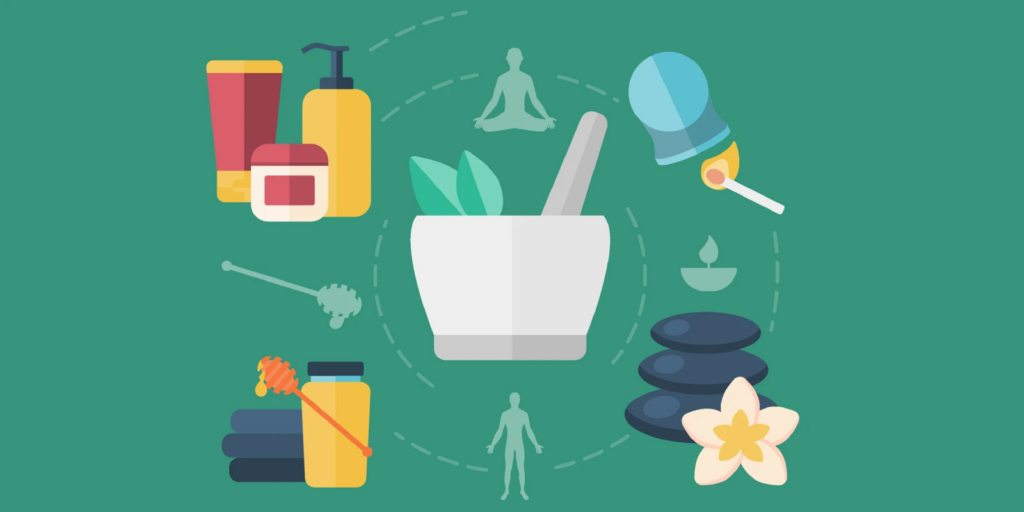
Holistic healing is an alternative medicine approach that takes into account the entire person – his body, mind, spirit, and emotions pursuing good health and fitness. Instead of taking on individual body parts or specific symptoms, holistic healing underscores the interconnections.
What Are The Foundations of Holistic Healing?
The foundations of holistic healing include treating the whole person, addressing physical, emotional, mental, and spiritual aspects, using natural therapies, and emphasizing prevention and self-care.
The heart of holistic healing lies in the interconnectedness of the mind, body, and soul. Just like mental states can be reflected through physical symptoms such as headaches or digestive complications, physical disorders may affect emotional and mental well-being.
To treat patients holistically, practitioners must, therefore, take into account these relationships rather than focusing on specific ailments.
There are two other fundamental facets of holistic healing: prevention and well-being rather than disease treatment. Proactivity allows individuals to control their healthcare through lifestyle changes, relaxation exercises, and self-care methods.
Holistic healing stresses that the human body will naturally rebalance itself when provided with ideal conditions.
What Are The Different Holistic Healing Techniques?
Different holistic healing techniques include acupuncture, Reiki, meditation, herbal medicine, aromatherapy, yoga, massage therapy, and nutritional counseling, each addressing various aspects of well-being.
Common holistic healing practices involve a combination of traditional and modern approaches to therapy. Some examples of these common holistic healing practices are as follows:
Acupuncture and TCM involves the application of thin needles into specific parts of the body in order to balance “qi” or life force.
Herbal Medicine uses plant-based remedies for health support and disease remedy. In some cases, practitioners may prescribe different herbs individually or in combination for specific diseases.
Holistic nutrition involves using food as medicine. This approach considers not only the nutrients contained in various foods but also their energetic qualities.
Massage and Bodywork enhances relaxation, relieves tension, and supports natural healing processes. Holistic healers use multiple types of massages with other types of body work.
Meditation, yoga, tai chi etc., are central to holistic healing. Movement integration through breath work and mindfulness are used by these practices to help reduce stress levels, enhance mental clarity and promote physical well being.
These energy based therapies work with the energy fields around our bodies such as Qigong, Reiki t to heal us with balance. Despite scientific controversy around it many people have testified on its benefits.
What Is The Role of Conventional Medicine in Holistic Healing?

Conventional medicine in holistic healing provides evidence-based treatments for acute conditions and integrates with holistic approaches to offer comprehensive, well-rounded care for overall health.
Holistic healing does not reject conventional medicine; instead, it integrates traditional medicine with complementary therapies for a more comprehensive approach to health.
There are many holistic practitioners who work in collaboration with medical doctors who are fully aware that both approaches have their strong points and can be used together.
For instance, a cancer patient might receive chemotherapy as part of their treatment while also using holistic practices such as acupuncture for pain management, meditation to reduce stress, and nutritional therapy as supportive care during treatment.
What Are The Benefits of Holistic Healing?
Benefits of holistic healing include improved overall well-being, personalized care, natural therapies, prevention-focused approaches, and addressing the root causes of health issues rather than just symptoms.
Holistic healing recognizes everyone as an individual. It provides treatments that are customized to meet personal needs. Individuals will have control over their own well-being.
It treats multiple dimensions of health and may result in deeper, longer-lasting improvements. Holistic healing concentrates on illness prevention.
What Are The Challenges of Holistic Healing?
Challenges of holistic healing include limited scientific evidence, inconsistent practitioner qualifications, potential lack of insurance coverage, and difficulty in integrating with conventional medical treatments.
Some holistic practices lack substantial scientific research to back up their efficacy. As opposed to conventional medical fields which have set guidelines, the practice of holistic healing lacks clear standards so the quality of services may vary.
The gap between these conventional and holistic treatments can be bridged, but it often presents a challenge because some members of the medical community may question its validity.
Insurance policies do not cover all holistic remedies therefore this makes them relatively expensive and uneconomical for many people.
Are holistic doctors legit?
Holistic doctors can be legitimate if they are properly trained and licensed, combining conventional and alternative approaches. However, qualifications and practices vary.
Holistic doctors are genuine practitioners who often possess medical degrees and additional certifications in holistic practices. They incorporate conventional and alternative therapies, as they concentrate on treating the whole person. Their legitimacy varies depending on jurisdiction and particular qualifications.
How does holistic therapy work?
Holistic therapy works by addressing the whole person—physical, emotional, mental, and spiritual—using natural methods and therapies to promote overall well-being.
To attain complete well-being, holistic therapy is about addressing the mind, body and spirit. It mixes traditional medical treatments with alternative therapies like acupuncture, nutrition or meditation to achieve balance and healing through natural methods and lifestyle changes.
What exactly is holistic medicine?
Holistic medicine is a health approach that treats the whole person—body, mind, and spirit—using natural therapies, lifestyle changes, and integrating conventional and alternative treatments.
Holistic medicine is a form of healthcare approach that takes into account the whole individual including physical, mental, emotional and spiritual aspects. This kind of medicine combines conventional medicine with complementary therapies aimed at prevention of diseases.
What's the difference between a holistic and a naturopath?

A holistic practitioner focuses on comprehensive, integrative care addressing all aspects of health, while a naturopath primarily uses natural remedies and treatments
A number of medical professionals may be included under this term, while for naturopaths, it specifically means those trained in naturopathic medicine which focuses on natural remedies and the body’s self-healing processes.
Can you heal your body holistically?
Yes, holistic approaches can support healing by addressing physical, emotional, and spiritual aspects of health, though they should complement, not replace, conventional medical treatments
When it comes to holistic healing it considers all aspects of the entire person including mind, body, and soul. It promotes overall well being and it cannot substitute proper medication for serious illnesses.
How effective is holistic therapy?
Holistic therapy’s effectiveness varies; it can improve overall well-being and address root causes, but outcomes depend on individual responses.
Holistic therapy’s effectiveness is dependent on the condition and the person being treated. A few have proven useful for stress, pain, and some chronic conditions, but the evidence is often limited.
Is holistic medicine a science?
Holistic medicine combines scientific principles with alternative approaches. While it incorporates evidence-based practices, some aspects lack scientific validation, making it partly scientific.
There are certain aspects of holistic medicine such as acupuncture and herbal medicine that have been supported by scientific research. Still, the field does not possess a robust scientific basis that underlies conventional medical practice.
Conclusion
Holistic healing provides a comprehensive approach to wellbeing dealing with the interconnectedness of body, mind and spirit. It aims at treating patients holistically rather than just symptoms by combining conventional and complementary approaches. Although it may face several hurdles along its way, this model of care is becoming increasingly popular among people seeking integrated healthcare solutions.
